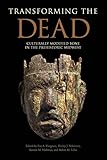Transforming the dead : culturally modified bone in the prehistoric Midwest / edited by Eve A. Hargrave, Shirley J. Schermer, Kristin M. Hedman, and Robin M. Lillie.
Material type: TextPublication details: Tuscaloosa : The University Alabama Press, (c)2015.Description: 1 online resourceContent type:
TextPublication details: Tuscaloosa : The University Alabama Press, (c)2015.Description: 1 online resourceContent type: - text
- computer
- online resource
- 9780817388096
- Social archaeology -- Middle West
- Material culture -- Middle West -- History -- To 1500
- Indians of North America -- Warfare -- Middle West -- History -- To 1500
- Indians of North America -- Funeral customs and rites -- Middle West -- History -- To 1500
- Military trophies -- Middle West -- History -- To 1500
- Burial -- Middle West -- History -- To 1500
- Human remains (Archaeology) -- Middle West
- Bones -- Social aspects -- Middle West -- History
- Woodland culture -- Middle West
- E99 .T736 2015
- COPYRIGHT NOT covered - Click this link to request copyright permission: https://lib.ciu.edu/copyright-request-form
| Item type | Current library | Collection | Call number | URL | Status | Date due | Barcode | |
|---|---|---|---|---|---|---|---|---|
 Online Book (LOGIN USING YOUR MY CIU LOGIN AND PASSWORD)
Online Book (LOGIN USING YOUR MY CIU LOGIN AND PASSWORD)
|
G. Allen Fleece Library ONLINE | Non-fiction | E99.84 (Browse shelf(Opens below)) | Link to resource | Available | ocn907618379 |
Browsing G. Allen Fleece Library shelves, Shelving location: ONLINE, Collection: Non-fiction Close shelf browser (Hides shelf browser)
Includes bibliographies and index.
1. Transforming the Dead / Shirley J. Schermer, Eve A. Hargrave, Kristin M. Hedman, and Robin M. Lillie -- I. Woodland Period -- 2. A Taphonomic Analysis of Hopewellian Modified Trophy Jaws / Stephen P. Nawrocki and Paul D. Emanovsky -- 3. Objectifying Middle Woodland Mortuary Practices through the Inclusion of Modified Human Jaws : A Central Illinois River Valley Case Study / Dawn E. Cobb -- 4. More than Skulls and Mandibles : Culturally Modified Human Remains from Woodland Contexts in Ohio / Cheryl A. Johnston -- 5. Arrangement of Human Remains and Artifacts in Scioto Hopewell Burials : Dramatic Rituals or Ritual Dramas? / Christopher Carr and Anna Novotny -- 6. Phallic Batons Made of Bone in the Collections of the Ohio Historical Society / Anne B. Lee and Cheryl A. Johnston -- 7. Excised and Drilled Human Bone from Eastern Iowa Woodland Sites / Shirley J. Schermer and Robin M. Lillie -- II. Mississippian Period -- 8. Life after Death : A Brief History of Human Bone Tools in Submound 51 at Cahokia / Eve A. Hargrave and Della Collins Cook -- 9. Opportunity Knocks : Nonritual Use of Human Bone at the Aztalan Site, Jefferson County, Wisconsin / Katie J. Zejdlik -- 10. Vessel, Ornament, Mask, or Rattle? : Reconstructing a Mississippian Worked Bone Object from the Angel Site / Della Collins Cook and Cheryl Ann Munson -- 11. Modification of Human Bone from Mississippian Caborn-Welborn Phase Sites in Southwestern Indiana and West-Central Kentucky / Cheryl Ann Munson, Della Collins Cook, and Mary Lucas Powell -- III. Late Prehistoric Period -- 12. Human Bone as Ritual Object? : Modified Human Bone from the Hoxie Farm and Anker Sites, Cook County, Illinois / Kristin M. Hedman -- 13. Grooved Teeth from Red Wing Locality Sites and the Loss or Gain of Identity / Kathleen T. Blue -- 14. Design Motifs and Other Modifications of Human Bone from Iowa Late Prehistoric Oneota Sites / Robin M. Lillie and Shirley J. Schermer -- IV. Perspectives -- 15. The Meaning of Scalping in Native North America / Linea Sundstrom -- 16. Contextualizing the Precolumbian Postmortem "Life" of Modified Human Remains / Maria Ostendorf Smith.
"Transforming the Dead, is a collection of essays that examines culturally modified human bones and their roles as 'cultural and ritual objects' among prehistoric Eastern Woodland cultures. Previous scholarship has explored the role of human body parts in Native American cultures as trophies of war and revered ancestors. This collection discusses new evidence that human elements were also important components of daily and ritual activities across the Eastern Woodlands. The contributors to this volume discuss each case study within the unique regional and temporal contexts of the material, rather than seeking universal answers to how these objects were used. Most research addressing modified human bone has focused on cut marks and trauma associated with warfare, trophy taking, and burial practices. The editors and contributors of Transforming the Dead document the varied and often overlooked ways that human bone was intentionally modified through drilling, incising, cutting, and polishing for utilitarian, ornamental, spiritual, or ritual use. Examples include bracelets and gorgets to be worn, as well as musical rasps, pipe stems, masks, and protective talismans. The form and function of these objects are not unusual; their construction from the remains of 'another' sets them apart. Through a flexible but systematic analysis of the archaeological record, the contributors bring into focus how the careful selection, modification, and retention of particular bones or body parts of an individual after death offer insights into concepts of personhood, the body, life, and death among the prehistoric Native Americans in the Midwest"--
COPYRIGHT NOT covered - Click this link to request copyright permission:
There are no comments on this title.







